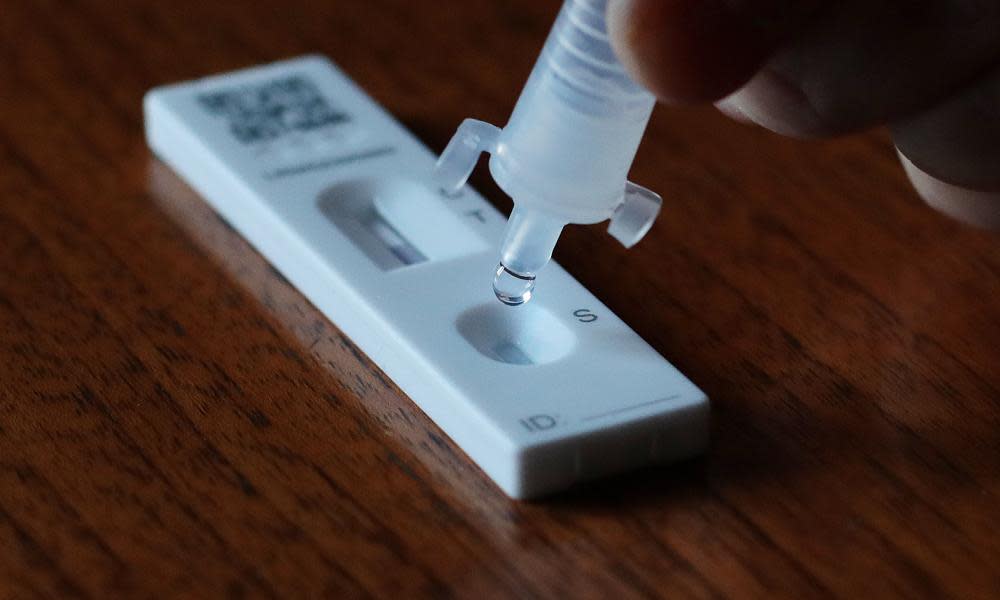Follow-up PCRs after positive lateral flow tests to be suspended in England

Follow-up PCR tests are to be temporarily suspended for asymptomatic people who have obtained a positive lateral flow test from 11 January.
The UK Health Security Agency (UKHSA) said the shift reflected the high accuracy of the tests and prevalence of coronavirus, which means the chances of false positives are very low.
The change will apply only to those in England taking routine lateral flow tests who do not have any symptoms of coronavirus, and they must still report their result on gov.uk and self-isolate for the minimum seven days. Anyone with any of the three main Covid symptoms, which are a high temperature, persistent cough and a loss or change to sense of smell or taste, must self-isolate, take a PCR test, and await the results.
UKHSA said lateral flow devices (LFDs) were most effective for people without symptoms, with 80% accuracy in finding the people with high viral loads who are most infectious. The agency added that for every 10,000 lateral flow tests carried out, there are likely to be fewer than three false positive results.
default
The agency added that this approach replicated the one taken between January and March last year, when confirmatory PCR tests were also suspended.
Jenny Harries, UKHSA’s chief executive, said: “While cases of Covid continue to rise, this tried-and-tested approach means that LFDs can be used confidently to indicate Covid-19 infection without the need for PCR confirmation.”
There are a small number of exceptions to the change, including people eligible for the £500 test and trace support payment, people participating in research and surveillance programmes, and the 1 million people at risk of becoming seriously ill from coronavirus who have been contacted by the NHS.
The care minister, Gillian Keegan, told the Today programme that the change was intended to reflect the “accuracy and the amount of lateral flow tests” rather than expressly to curb staff shortages. She said there were “no immediate plans” to reduce the seven-day minimum isolation period down to five if a negative lateral flow is obtained, but added that it was “a reasonable question to ask” and one that was being considered by scientists.
About 1 million people are thought to be isolating due to Covid, causing widespread absences and disruption across essential services, including healthcare, police and food processing.
Keegan told Sky News that although the government did not collect figures on self-isolation, it estimated these based on the number of people who had tested positive in recent days, including Tuesday’s record of 218,724.
Hospitals are reporting that they are struggling to cope with staff absences, with several declaring critical incidents and 17 in Greater Manchester saying they would suspend some non-urgent surgery as 15% of staff were off sick. An internal memo from the North East ambulance service foundation trust suggested that call handlers recommend people suffering from a heart attack or stroke get a lift into hospital from friends or family.
Matthew Taylor, the chief executive of the NHS Confederation, told the Today programme that healthcare absences were averaging at about 10%, with Covid the biggest reason, but that this figure was much higher in some hospital trusts.
He approved of the plans to remove the confirmatory PCR “as long as it’s based on the science” and not on “politics and blind hope”, and welcomed any measures that could ease pressure on hospitals, which are asking staff on leave or rest days, or who are recently retired, to come back.
Asked about whether another possible solution could include bringing the isolation period down to five days, he reiterated this would only be an option “if the science indicates it’s safe”. He added: “The situation in relation to staff absences is so acute that we need to consider all possibilities.”
Keegan said the government had known this would be one of “the most pressurised winters” due to the NHS backlog that has built up over the pandemic, combined with flu and the arrival of the Omicron variant. “That’s why we’ve put an extra £5.4bn of investment to try and get extra staff, get some extra capacity to be able to put virtual wards in place, extra beds and extra capacity with the Nightingales,” she said.
Keegan said she had asked NHS England to look into reports that friends or family were being asked to transport potential heart attack or stroke sufferers to hospital, which she said was not “an acceptable approach”.
She told Sky News: “That is not what we have put in place at all. We have more ambulance crews in operation than we have ever had, we also gave £55m extra just for this period to cover staff and make sure we had increases in staff and staffing levels.”

 Yahoo News
Yahoo News 
